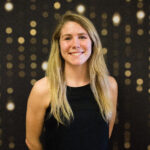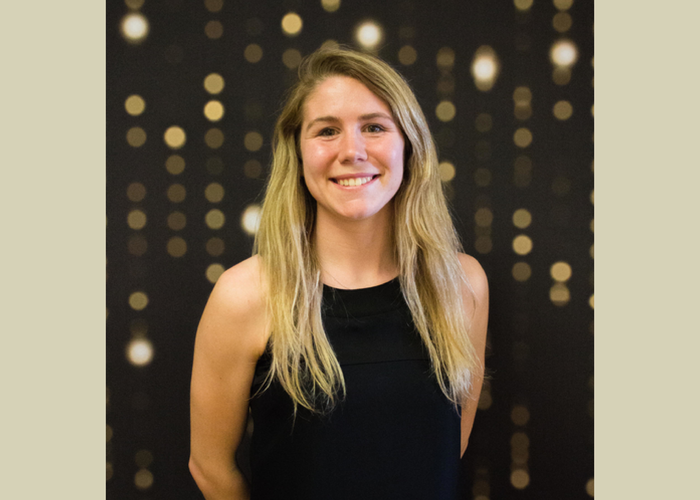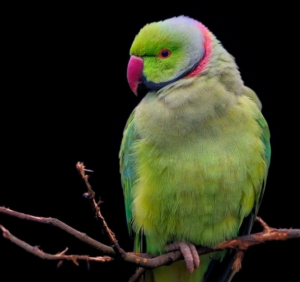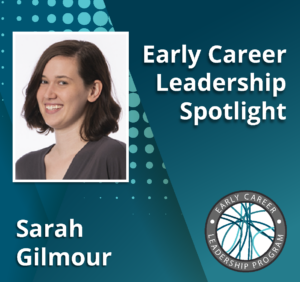We’re taking time to get to know the members of the GSA’s Early Career Scientist Committees. Join us to learn more about our 2021 early career scientist advocates.

Melissa Drown
Career Development Subcommittee
University of Miami
Research Interest
For my thesis, I study the evolution of complex traits such as metabolic rate and thermal tolerance in a small salt marsh fish Fundulus heteroclitus. Although many believed that introduction of next-generation sequencing (NGS) technology would mean answers to some of nature’s most intriguing questions, including the genetic basis of human diseases and other complex traits, this has not been the case. While the increase in genomic data due to NGS has no doubt improved our understanding of how genes influence traits, including disease risk, it has also failed to provide the definitive answers we had hoped for. Rather than demonstrating that one gene is responsible for a huge amount of variation in a trait, which would then allow that trait to be readily selected for or altered through genetic engineering, we have learned that many traits are polygenic. A polygenic trait relies on tens, hundreds, or thousands of genes rather than one or few, making it much more challenging to determine which genes are important. To further complicate matters, we also know that the genes that are important for a trait are highly context dependent and may differ among individuals (i.e., redundant). This makes it seemingly impossible to nail down a single gene or set of genes that matter for a trait of interest. In order to understand complex traits in F. heteroclitus, I am using a combination of physiology and genomics to investigate how genotype and gene expression patterns explain variation in complex, likely polygenic traits among individuals from populations that experience different local temperatures. Studying the genetic basis for complex traits will help us predict organismal response to environmental change and understand the importance of genetic variation within populations in shaping variation in complex traits.
As a PhD-trained scientist, you have many career options. What career paths interest you the most?
I wanted to pursue a PhD because I want to remain in academia. I have always been successful in an academic environment and enjoy the flexibility as well as the combination of research, mentorship, and teaching that a career in academia offers. I would especially enjoy holding a tenure track position at an R1 institution where research is highly valued, and there are opportunities to mentor research-minded undergraduate and graduate students. That being said, I was fortunate to spend a summer as an intern with the National Oceanic and Atmospheric Administration and found that their research scientists have a very similar role at the research centers as faculty do at R1 institutions. They write grants, attend conferences, publish their research, and serve as mentors for students ranging from elementary school through postdoctoral training. Either opportunity would allow me to lead a team of researchers and one day have my name on the door of a lab.
In addition to your research, how else do you want to advance the scientific enterprise?
As a future faculty member, I aim to provide a safe environment where all students can learn. A recent article in Nature (Freeman 2018) describes many challenges that LGBT+ individuals face in pursuing STEM careers. Specifically, up to 69% of LGBT+ faculty who are out to their coworkers reported feeling uncomfortable in their department, which may contribute to their low retention rates (Partridge et al. 2014). The lack of transparency by LBGT+ faculty in STEM contributes to low retention of students (underrepresented by up to 21%) because they do not see people they can identify with in their chosen field (Freeman 2018). In my own personal experience, I did not meet an openly LGBT+ faculty member until the final year of my undergraduate degree. During my first two years in graduate school, I have mentored seven undergraduate students, two of whom are now pursuing PhDs. When working with students I am transparent about my values and my identity as a member of the LGBT+ community. I firmly believe that this approach to mentoring has allowed me to build more meaningful relationships with students, which ultimately makes them more successful. After completing my PhD, I plan to pursue tenured faculty positions, allowing me to combat these problems from a position of leadership within a university system. I want to serve as a resource and an example of what can be achieved for students who identify as LGBT+ in the life sciences and other STEM fields.
As a leader within the Genetics Society of America, what do you hope to accomplish?
Many of my professional goals align closely with the desired outcomes of the Genetics Society of America Early Career Leadership Program (ECLP), including networking with other early career leaders and providing relevant programming for early career members. I hope that my involvement with the Career Development Subcommittee of the Early Career Leadership Program will accomplish three main goals: 1) to build connections with other GSA members, especially those whom I would be unlikely to meet outside of the ECLP, and 2) provide a new perspective by recruiting speakers and featuring content from individuals belonging to traditionally marginalized groups, and 3) improved accessibility of resources developed by the Career Development team (stay tuned for our new Career-Dev Toolkit!). By accomplishing these goals, I hope to help GSA to better serve their early career members, especially those who may frequently question whether they “belong” in science.
Previous Leadership Experience
Before joining the ECLP as a third-year PhD student in 2020, I completed my Bachelor of Science at the University of Minnesota. As an undergraduate student I was involved with Club Hockey and spent four years on the executive board of our club team and two years on the University-wide sports club advisory council. While attending graduate school in Florida has prevented me from furthering my hockey career, I have focused my leadership and service on the betterment of the University of Miami and the broader South Florida LBGT+ community. I have spent two years working with the AQUA Foundation for LGBT+ Women as a member of their scholarship and mentorship program. With the AQUA Foundation, I have dedicated time to fundraising for the American Foundation for Suicide Prevention and the Florida AIDS Walk. I have additionally served two years on the GradOUT executive board, which is a student group for LGBT+ graduate students at the University of Miami, and two years on the executive board of our Marine Biology and Ecology department Coding Club. Outside of graduate school I have volunteered with the annual LGBT+ Task Force Gala and Point Foundation fundraisers.
Contact Melissa Drown on LinkedIn, Twitter, or her personal website.
References
1. Freeman, J., LGBTQ scientists are still left out. Nature, 2018. 559(7712): p. 27-28.2. Partridge, E., V., R. Barthelemy, S., and S. Rankin, R., Factors impacting the academic climate for LGBQ stem faculty. Journal of Women and Minorities in Science and Engineering, 2014. 20: p. 75-98.













